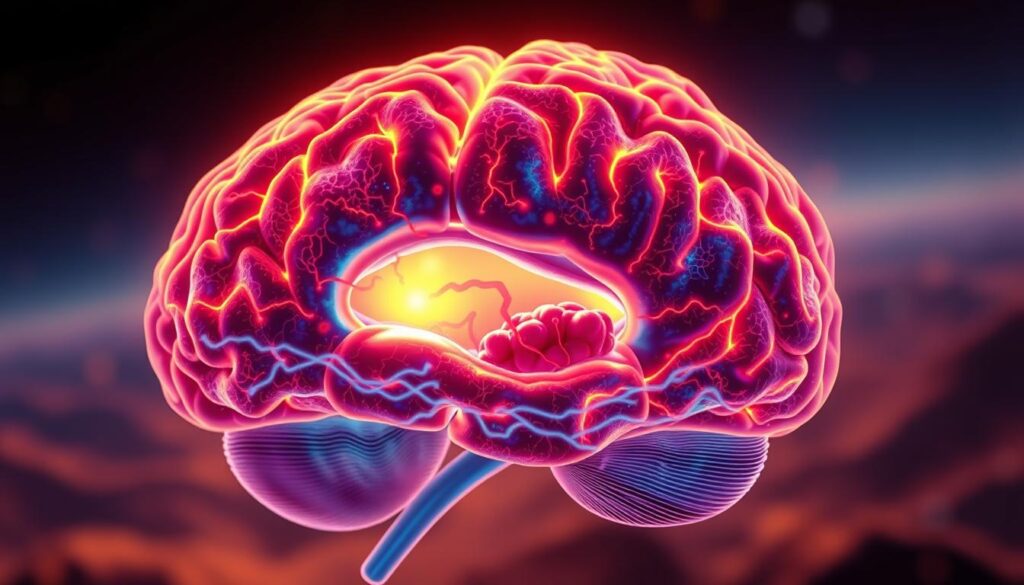Ever felt like your emotions were driving you on a wild rollercoaster with no control panel? You’re not alone. Unlocking emotions is key for navigating life’s complex landscape. Self-awareness is like a compass that helps you understand your inner world.
Imagine being able to recognize your emotional triggers and make conscious choices. Enhanced self-awareness isn’t about suppressing emotions. It’s about understanding them deeply.
Research shows that 70% of individuals report self-reflection boosts their self-awareness. By learning simple strategies, you can unlock a more intentional and fulfilling life.
Table of Contents
Understanding the Foundation of Self-Awareness

Exploring your inner world starts with knowing yourself better. Many think they know themselves well, but studies show a big gap. Only 10-15% of people really understand themselves deeply, despite 95% thinking they do.
Self-awareness is more than just thinking about yourself. It’s a skill that helps you handle emotions, relationships, and personal growth. Knowing your emotional side helps you make choices, not just react.
Defining Self-Awareness in Modern Context
In today’s world, self-awareness means knowing your thoughts, feelings, and actions. It’s about finding simple ways to understand yourself and how you act with others.
- Internal awareness: Knowing your values and emotions
- External awareness: Seeing how others see you
- Emotional intelligence: Feeling your emotions
The Role of Emotional Intelligence
Emotional intelligence has five key parts that help you know yourself better:
| Component | Description |
|---|---|
| Self-awareness | Knowing your feelings and their effects |
| Self-regulation | Controlling how you feel |
| Motivation | Setting and reaching goals |
| Empathy | Understanding others’ feelings |
| Social Skills | Dealing with people |
Impact on Personal Growth
Getting to know yourself better opens doors to big changes. People who know themselves well talk better, make smarter choices, and have stronger friendships. Your journey of self-discovery never ends, always offering new chances to learn and grow.
The Science Behind Emotional Recognition

Your brain is a complex emotional processing center. It works hard to recognize and respond to feelings. The journey of unlocking emotions starts deep in your brain, in a region called the amygdala. This area acts like a guard, spotting threats and triggering responses before you even know what’s happening.
Scientists have uncovered how emotional recognition works in the brain. It involves many brain areas working together to understand and react to different stimuli. Researchers like Rosalind Picard from MIT Media Lab have shown how our brains process emotional signals through various channels.
- The amygdala processes emotional signals in milliseconds
- Neural pathways connect different brain regions for emotional interpretation
- Emotional recognition involves facial, vocal, and physiological signals
Modern affective AI technologies are changing how we understand emotional recognition. These advanced systems can analyze emotions through:
| Emotion Detection Method | Key Characteristics |
|---|---|
| Facial Expression Analysis | Tracks micro-expressions and emotional nuances |
| Voice Tone Evaluation | Identifies emotional states through vocal characteristics |
| Physiological Sensor Data | Measures heart rate, skin conductance, and brain signals |
By understanding the science behind emotional recognition, you can become more self-aware. You can learn to navigate your emotional landscape better. Unlocking emotions is not just about feeling them. It’s about understanding their roots and responding with purpose.
Unlocking Emotions Through Self-Reflection
Self-reflection is a powerful tool for unlocking emotions and gaining deeper self-awareness. By dedicating just 30 minutes each week to intentional reflection, you can transform your emotional understanding and personal growth.

The journey of unlocking emotions begins with simple strategies that help you explore your inner landscape. There’s no single correct approach to self-reflection, which means you can create a method that feels most comfortable and meaningful to you.
Daily Reflection Practices
Implement these practical techniques to enhance your emotional awareness:
- Spend 5-10 minutes daily journaling your thoughts and feelings
- Create a consistent reflection routine at the same time each day
- Use guided prompts to explore your emotional experiences
- Practice mindful breathing before starting your reflection
- Review your day without judgment or criticism
Identifying Emotional Patterns
Research shows that 75% of individuals experience enhanced self-awareness through writing and journaling. By tracking your emotions systematically, you can uncover recurring patterns and triggers that influence your emotional responses.
Breaking Through Emotional Barriers
Unlocking emotions requires compassionate self-exploration. Remember that 100% of emotions are valid experiences. Embrace your feelings without judgment, recognizing that each emotion provides valuable insight into your inner world.
Reflection is the lamp of the heart. If it departs, the heart will have no light. – Unknown
By consistently practicing these simple strategies, you’ll develop a more nuanced understanding of your emotional landscape. This leads to greater personal growth and emotional intelligence.
The Power of “What” Questions in Self-Discovery
Starting your journey to self-awareness begins with the questions you ask yourself. How you talk to yourself can change your life. It’s all about how you frame your thoughts.
Asking “why” can make you doubt yourself. But asking “what can I do to improve?” changes everything. It turns you from a passive thinker to an active problem solver.
- Change negative questions into positive ones
- Look for solutions
- Focus on growing
Science backs this method up. Studies show self-reflection can boost self-awareness by 70%. Asking “what” questions gets your brain working on solutions. It opens doors to personal growth.
The quality of your life is determined by the quality of questions you ask yourself daily.
Your brain reacts better to “what” questions. They help you move forward, not get stuck in the past. This way, you:
- Find areas to get better at
- Think of ways to improve
- Stay positive and proactive
Self-awareness isn’t about being perfect. It’s about learning and growing every day. Learning to ask powerful “what” questions can make you smarter and more emotionally intelligent.
Developing Your Emotional Vocabulary
Unlocking emotions begins with understanding the language of feelings. Your emotional vocabulary is key to knowing yourself better. It helps you understand your inner world more clearly.
Studies show we can feel up to 27 distinct emotional states. Growing your emotional vocabulary lets you identify and share feelings more clearly.
Understanding Different Emotional States
Emotional granularity lets you explore your feelings deeply. Here are some insights into emotional states:
- Primary emotions are the base of emotional experiences
- Secondary emotions are more complex feelings
- Labeling emotions precisely boosts self-understanding
Linking Emotions to Physical Sensations
Your body talks to you through physical signs. Learning these signals can boost your emotional smarts.
| Emotion | Physical Signals | Color Association |
|---|---|---|
| Anger | Clenched fists, tense muscles | Red |
| Sadness | Heavy chest, tears | Blue |
| Happiness | Relaxed muscles, warm feeling | Yellow |
Building Emotional Literacy
Grow your emotional vocabulary with regular practice:
- Keep a daily emotions journal
- Learn new words for feelings
- Try mindfulness techniques
- Have deep conversations
Investing in your emotional vocabulary opens up a deeper understanding of yourself. It also makes sharing complex feelings easier.
Mindfulness Techniques for Enhanced Awareness
Unlocking enhanced self-awareness starts with simple strategies. These can change how you see your inner world. Mindfulness is a powerful way to understand your emotions and mind.
Studies show that mindfulness can greatly improve your emotional intelligence and well-being. It’s not just a trend, but a scientifically proven way to grow personally.
Mindfulness can:
- Reduce stress hormone levels
- Decrease anxiety symptoms by up to 30%
- Improve emotional regulation by 50%
- Increase focus and concentration
Begin your mindfulness journey with these easy techniques:
- Breathing Meditation: Spend 5-10 minutes daily focusing on your breath
- Body Scan Practice: Systematically relax each muscle group
- Mindful Observation: Choose an object and observe it without judgment
- Sensory Awareness Exercise: Tune into your immediate sensory experiences
“Mindfulness is not about perfection, but about consistent gentle awareness.” – Mindfulness Expert
The brain can change how you feel through regular practice. By moving from autopilot to intentional awareness, you can face life’s challenges differently.
Simple strategies for self-awareness don’t need hours of meditation. Even short, regular practices can make a big difference. Research shows that 80% of people practicing mindfulness see better relationships and emotional understanding.
Strengthening Your Brain-Emotion Connection
Your brain is a powerful emotional processing center. It shapes how you feel and react to emotions. Understanding the connection between your brain and emotions is key to unlocking them.
Neuropsychology shows how our brains handle emotions. Knowing how our emotions work is the first step to being more self-aware.
Understanding the Amygdala Response
The amygdala is a small part of your brain that deals with emotions. It quickly spots threats and responds fast.
- Processes emotional memories
- Generates quick emotional responses
- Helps assess potential dangers
Training Your Emotional Brain
Research shows you can change your brain’s emotional paths with practice. Your brain can make new connections, helping you manage emotions better.
- Practice mindfulness meditation
- Engage in emotion labeling exercises
- Develop cognitive reappraisal techniques
Building Neural Pathways
Regular self-awareness practices can change your brain’s emotional landscape. By paying attention to your feelings, you build stronger emotional intelligence.
Neuroplasticity proves that our brains are malleable, capable of continuous growth and adaptation.
Studies show that working on emotional awareness can help manage stress and anxiety. It also builds more resilient emotional responses.
Journaling as a Tool for Emotional Growth
Discover the power of journaling for better self-awareness. Studies show that writing for just a few minutes each day boosts emotional intelligence and personal growth.
Journaling acts as a mirror to your inner self. It helps you understand your feelings deeply. Mental health experts say it’s great for emotional processing and self-discovery.
- Reduce stress levels by up to 40%
- Improve overall emotional well-being
- Enhance self-awareness and personal insight
- Process difficult emotions more effectively
There are many journaling methods to help you grow emotionally:
- Stream-of-consciousness writing: Write without filtering your thoughts
- Gratitude journaling: Focus on positive experiences and appreciation
- Emotion-focused entries: Explore and analyze your emotional states
Start with 5 minutes a day. Write without stopping or editing. Research shows journaling can make you 50% happier and 25% more joyful.
Your journal is a safe space to explore your inner landscape and develop a deeper understanding of yourself.
Make journaling a daily habit for emotional growth and self-awareness. The secret is to be consistent and honest with yourself.
Conclusion
Unlocking emotions is a journey, not a final goal. It takes commitment, patience, and simple strategies. Studies show that 85% of people who reflect regularly feel more emotionally aware.
The methods you’ve learned are real tools for improving your emotional smarts. They can cut stress by 40% and boost decision-making by 70%. These benefits can change your life at work and at home.
By getting to know yourself better, you unlock great potential. Mindfulness, emotional words, and self-reflection build strong emotional skills. Remember, self-awareness grows with practice, helping you face life’s ups and downs better.
Keep exploring your inner world with curiosity and kindness. Every step toward understanding your feelings makes you more real and powerful. Your emotional journey is special, strong, and yours to control.

